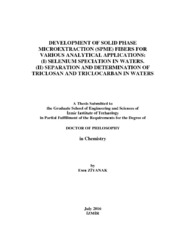Please use this identifier to cite or link to this item:
https://hdl.handle.net/11147/4838| Title: | Development of Solid Phase Microextraction (spme) Fibers for Various Analytical Applications: (i) Selenium Speciation in Waters. (ii) Separation and Determination of Triclosan and Triclocarban in Waters | Other Titles: | Çeşitli Analitik Uygulamalar için Katı Faz Mikroekstraksiyon (spme) Fiberlerin Geliştirilmesi. (ı) Sularda Selenyum Türlemesi. (ıı) Sularda Triklosan ve Triklokarban Ayrımı ve Tayini | Authors: | Ziyanak, Esen | Advisors: | Eroğlu, Ahmet Emin | Keywords: | SPME fibers Solid phase microextraction Triclosan Triclocarban Fibers Selenium compounds |
Publisher: | İzmir Institute of Technology Izmir Institute of Technology |
Source: | Ziyanak, E. (2016). Development of solid phase microextraction (SPME) fibers for various analytical applications: (I) Selenium speciation in waters. (II) Separation and determination of triclosan and triclocarban in waters. Unpublished doctoral dissertation, İzmir Institute of Technology, İzmir, Turkey | Abstract: | In the first part of this study, four selenium species namely selenite, selenate, selenomethionine and selenocystine in water samples were tried to be separated using single solid phase microextraction (SPME) fiber on the same chromatographic run. Bare silica fibers were immersed into agarose matrix containing nano zerovalent iron (nZVI), ceria (CeO2) or zirconia (ZrO2). After characterization of fibers sorption/desorption parameters were optimized and standard reference materials were used to validate the proposed method. Direct mode of SPME method was used to extract the analytes prior to their separation with HPLC and detection with ICPMS. The optimum conditions for the extraction of selenium species with nZVI-agarose fibers are obtained as extraction pH: 4.0, agitation speed: 700 rpm, extraction time: 60 min, desorption matrix: 10.0 mM citrate solution, desorption time: 30 min, solution temperature: 25 °C, ionic strength: no NaCl addition. In the second part of this study, same fibers were used to separate triclosan (TCS) and triclocarban (TCC) using HPLC-DAD. Among all fibers prepared, nZVI-agarose modified fibers demonstrated the best extraction performance. The optimum conditions for the extraction of TCS and TCC with nZVI-agarose fibers are obtained as extraction pH: 5.0 and 7.0, agitation speed: 400 rpm, extraction time 60 min, desorption matrix: % 90 methanol - %10 water (adjusted to pH 3.0 with acetic acid), desorption time: 30 min, ionic strength: no NaCl addition. Çalışmanın ilk kısmında, su örneklerinde bulunan dört selenyum türünün (selenit, selenat selenometiyonin ve selenosistin) tek bir SPME fiberi kullanılarak aynı kromatografik uygulamada ayrılmasına çalışılmıştır. Bu amaçla, silika fiberler sıfır değerlikli demir nanoparçacıkları, serya (CeO2) veya zirkonya (ZrO2) içeren agaroz matriksine daldırılarak kaplanmıştır. Modifiye edilmiş fiberlerin karakterizasyonu için SEM görüntüleri, EDX ve XRD spektrumları alınmıştır. Fiberlerin karakterizasyon işleminden sonra sorpsiyon/desorpsiyon koşulları optimize edilmiş ve önerilen metotu doğrulamak için standart referans maddeler kullanılmıştır. Direkt SPME metodu kullanılarak ekstrakte edilen analitler HPLC ile ayrılmış ve ICPMS ile tayin edilmiştir. Selenyum türlerinin nZVI-agaroz fiberleriyle yapılan ekstraksiyon işlemi için optimize edilmiş koşulların sonuçları şu şekilde elde edilmiştir; çözelti pH’sı: 4,0, karıştırma hızı: 700 rpm, ekstraksiyon süresi: 60 dk, desorpsiyon matriksi: 10,0 mM sitrat çözeltisi, desorpsiyon süresi: 30 dk, çözelti sıcaklığı: 25 °C, iyonik güç: tuz eklemeden. Çalışmanın ikinci kısmında, aynı fiberler triklosan HPLC-DAD ile (TCS) ve triklokarban (TCC) ayrımı için kullanılmıştır. Hazırlanan bütün fiberler içerisinde en iyi ekstraksiyon performansını nZVI-agaroz fiberleri göstermiştir. TCS ve TCC maddelerinin nZVI-agaroz fiberleriyle yapılan ekstraksiyon işlemi için optimize edilmiş koşulların sonuçları şu şekilde elde edilmiştir; çözelti pH’sı: 5,0 ve 7,0, karıştırma hızı: 400 rpm, ekstraksiyon süresi: 60 dk, desorpsiyon matriksi: % 90 metanol - %10 su (pH’sı asetik asit ile 3,0’a ayarlanmış), desorpsiyon süresi: 30 dk, iyonik güç: tuz eklemeden. |
Description: | Thesis (Doctoral)--İzmir Institute of Technology, Chemistry, İzmir, 2016 Full text release delayed at author's request until 2018.08.22 Includes bibliographical references (leaves: 80-86) Text in English; Abstract: Turkish and English xii, 86 leaves |
URI: | http://hdl.handle.net/11147/4838 |
| Appears in Collections: | Phd Degree / Doktora |
Files in This Item:
| File | Description | Size | Format | |
|---|---|---|---|---|
| T001488.pdf | DoctoralThesis | 2.48 MB | Adobe PDF |  View/Open |
CORE Recommender
Page view(s)
248
checked on Apr 14, 2025
Download(s)
130
checked on Apr 14, 2025
Google ScholarTM
Check
Items in GCRIS Repository are protected by copyright, with all rights reserved, unless otherwise indicated.